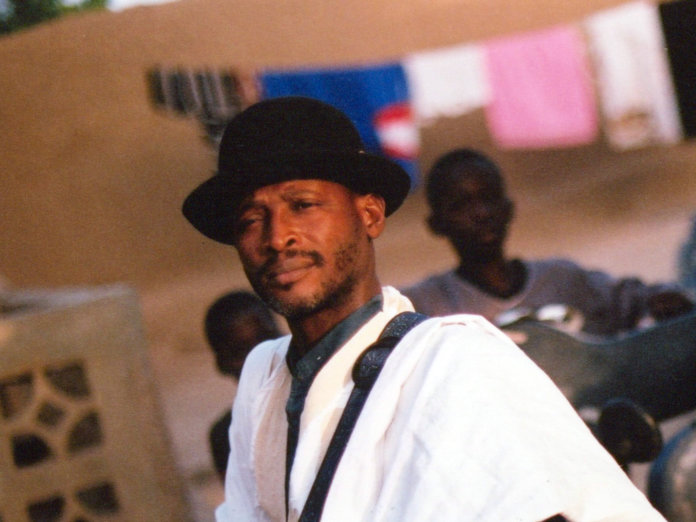When Ali Farka Touré died in 2006, Afel Bocoum seemed perfectly placed to take over the great man’s mantle. Touré’s compelling desert blues had earned him a roster of western admirers ranging from Ry Cooder to Jimmy Page to John Lee Hooker, and a trio of Grammy awards – and Bocoum was his most talented protégé.
Hailing from the same town of Niafunké in the Timbuktu region of northern Mali on the River Niger, Bocoum had fallen under Touré’s spell as a boy in the ’60s. He went on to play in Touré’s band for more than 20 years, touring the world with him and playing on his albums in between his day jobs as a civil servant in the agriculture department and a cultural animateur for the Ministry Of Youth.
He made a fine debut solo album for World Circuit in 1999 with Alkibar and perhaps only a lack of ambition subsequently held him back. His first solo album was recorded at the same sessions as Touré’s Grammy-nominated Niafunké album and the motivation for it seemed to come more from his mentor, who played on the record, than from Bocoum himself. “Everybody else seemed to be releasing albums, so it was like, ‘Why not?’” he shrugged self-deprecatingly.
Certainly there was never anything as vulgar as a career plan. Over the next decade there followed two low-key albums on the obscure Belgian label Contre-Jour, but Bocoum seemed happier as a collaborator than as a band leader. After playing on Damon Albarn’s 2002 album Mali Music, he became a regular on board the Blur singer’s cross-cultural Africa Express.
Now in his mid-sixties, in a sense Lindé is the true follow-up to the solo debut he made more than 20 years ago and proves that under the right guidance, Bocoum can be a fine frontman. Here he has two powerful figures to direct his focus in executive producers Albarn, who describes Bocoum’s voice as “one of the treasures of Mali”, and Nick Gold, who produced most of Toure’s greatest recordings as well as Bocoum’s debut. The latter’s long-standing immersion in traditional African music and the restless adventurism of the former is a winning combination that has coaxed something rather special out of Bocoum.
Lindé is steeped in the heritage of the Songhai, the ethnic group whose empire dominated the western Sahel 500 years ago and to which both Bocoum and Touré’s families belong. The core of the sound is built around tribal African instruments – the earthy plunk of the banjo-like ngoni, the drone of the two-string njurkele, the rippling kora and insistent calabash percussion from the late Hama Sankaré.
The songs pack a message that is both specific to Bocoum’s homeland but also universal. In the face of Mali’s crushing struggles with jihad, poverty and tribal war, Bocoum urges hope, solidarity and unity. “If you’re hiding down holes, my brothers/Come out so that we can talk,” he pleads in a direct message to the jihadists on “Sambu Kamba”, while the heartfelt call-and-response lyrics of “Dakamana” translate as “It’s time for us to work together, hand in hand and make 2020 a year for peace in Mali.” The death of Sankaréin March this year underlines the urgency of Bocoum’s message. The calabash player was killed along with eight others when the vehicle in which he was riding was hit by an improvised explosive device close to Bocoum’s hometown.
The traditional instruments are embellished with some exquisitely modern touches. On “Bombolo Liilo” the kora of Sidiki Diabaté (brother of Toumani) and the trombone of the Skatalites’ Vin Gordon dance an irresistible pas de deux to an African reggae beat. “Avion” is a pan-African excursion on which Congolese soukous meets Malian tradition with an added dash of Afrobeat. Elsewhere there are psych guitars courtesy of Mark Mulholland and Garba Touré from Songhoy Blues, and the violin of Joan As Police Woman snakes sinuously around the haunting desert-blues sound of Yoro Cissé’s njurkele on “Fari Njungu” and “Yer Gando”.
The album closes in a clattering symphony of syncopated rhythm on “Djougal”, as the distinctive powerhouse drumming of Tony Allen joins the kinetic beat of Sankare’s chattering calabash. Tragically it would turn out to be their final percussive hurrah. Both died within four weeks of each other, prior to Lindé’s release.
Touched by sadness but tinged with hope, this is a masterful album on which the sound of tradition is rendered vital and visceral in a very present tense.



